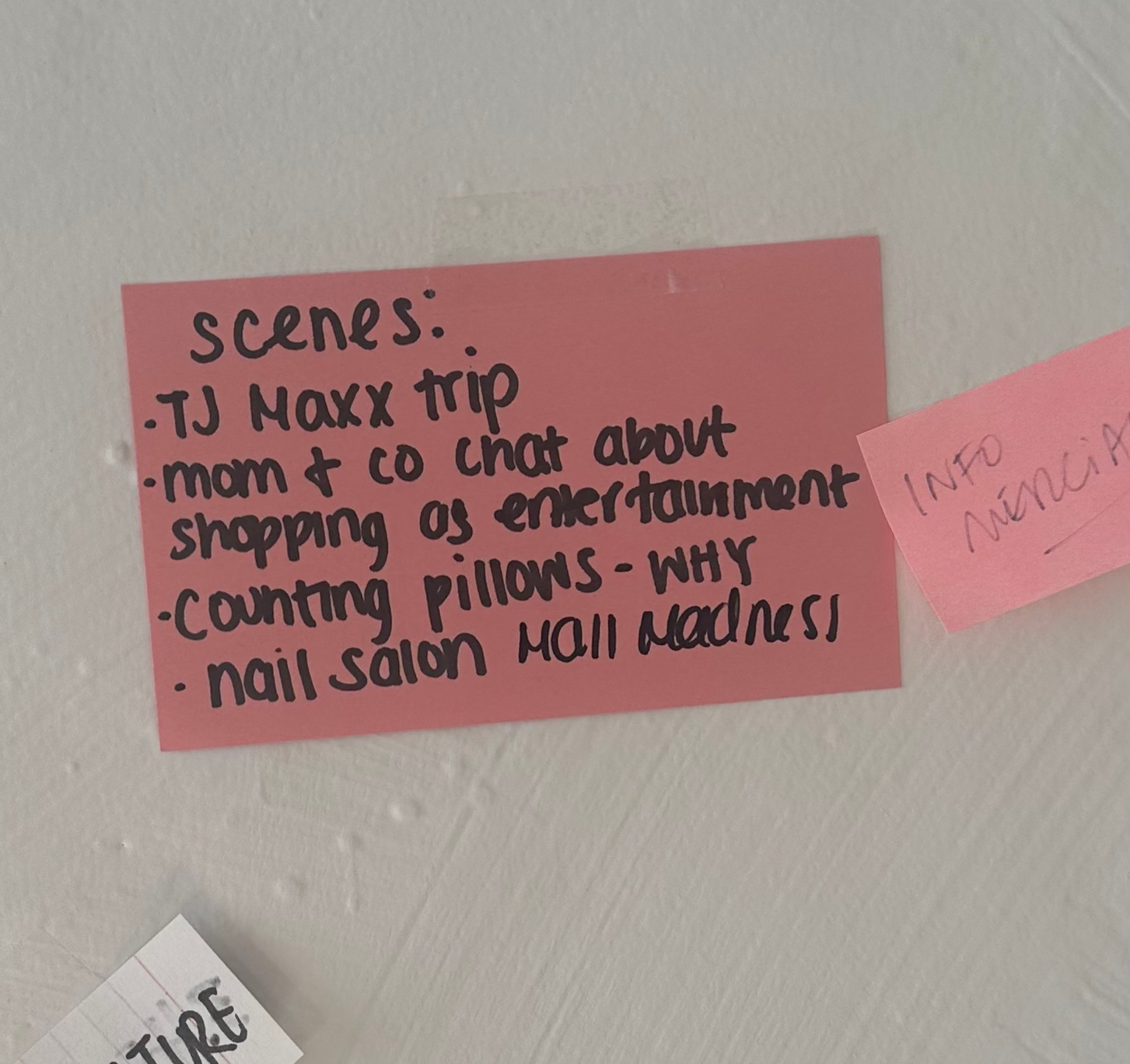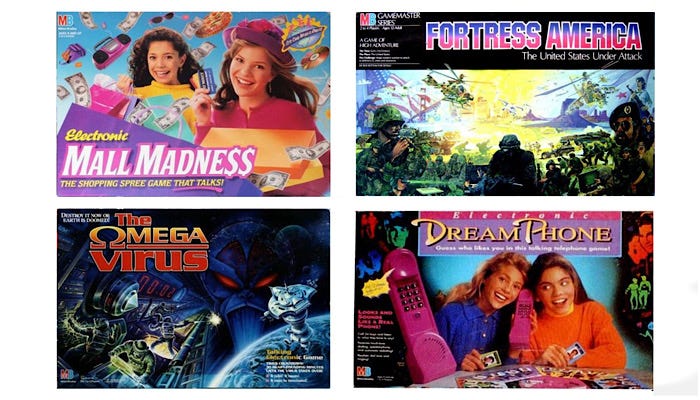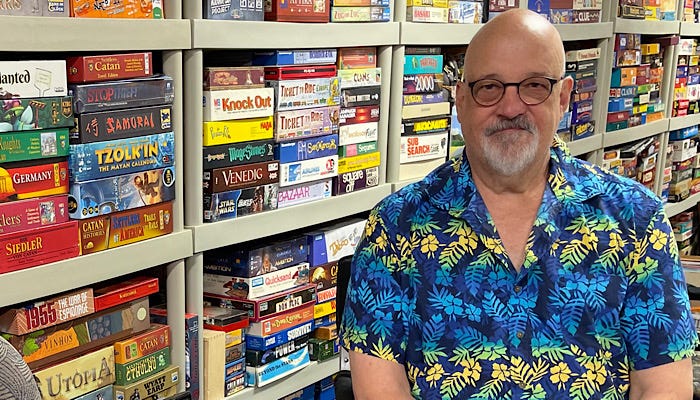From the moment we started brainstorming a shopping-focused episode of Debt Heads, I’ve been subtly (read: not subtly) pushing one specific agenda: a Mall Madness deep dive.
Like, here it is written on an index card from two years ago when we started talking about the project, still proudly hanging on the wall:
Mall Madness was one in a long list of shopping-centric forms of entertainment (television shows Supermarket Sweep and Shop til’ You Drop being the others) that delighted me as a child.
The game debuted right before I was born in 1988 (coincidence???), and the object was to be the first to buy everything on your shopping list and make it back to the parking lot. There were sales, clearances, credit cards, an ATM, an electronic card reader that spoke to you.
It was like being at the mall — at home. What could be better than that?
If you’ve listened to Debt Heads (you haven’t listened to Debt Heads? What are you doing with your time then?!) you know that I did eventually see my dreams come to fruition: there’s a nod to the beloved board game in episode two, part one:
But I wasn’t quite ready to check out on the Mall Madness content just yet. I wanted to know more. I wanted to know about the genius behind this ahead-of-its-time game, the one that may or may not have turned me into a crazed creature of consumption.
Game designer Mike Gray — an icon of the board game world (at one time he had 36 games on the market at Toys R Us) — is responsible for creating two of my personal favorites: Dream Phone and — you guessed it! — Mall Madness.
Thanks to some savvy sleuthing, I was lucky enough to swipe an interview with him, which I have shared below.
OK, I have to know. How did you come up with the idea for Mall Madness?
I created a game back in 1980 called Bargain Hunter. It was about furnishing your new apartment after graduating from college. It had a square track around the board with a credit card machine in the center. Credit cards were the things everyone had to have. The credit cards made the credit spinner spin.
The idea for Mall Madness was to update Bargain Hunter to be a shopping mall (they were big then) and make it electronic.
Is the game inspired by your own interests/shopping habits?
I designed the gameplay based on how I shopped back then. Go to the mall, buy what you went for and get out. It made for good gameplay, as it was basically a race to buy your stuff first.
When playing it years later with my daughter, it was pointed out that women like to browse and look around for stuff in the stores. They could spend hours there. I never did that.
So do you like shopping? How do you feel about the shifting shopping landscape from in person to online?
Well, I buy almost everything online. Except bird food (I have ten feeders) and groceries and pizza. I guess I don’t like shopping. I would rather be home playing board games. I am 73 now and I play online and in person every day.
what’s something you’re most proud of about the game?
The real magic of the game is hidden. The electronics designer (Bob Driscoll) and I put some great innovation in the game. The game knew (by design) who was winning. So we didn’t make the events — good or bad — random.
We had the game give more bad events to the current winner ,and good events to the player who bought the fewest items so far. Remember that the goal of the game is to stretch your cash to buy six things and get back to your car.
Buying stuff that was not on SALE or CLEARANCE meant you ran out of money and had to travel to the cash machine in the center of the mall. Anyway, by sneaking this into the programming, we made every game close!
I don’t know if any game has ever done that. Bob and I kept that a secret and didn’t tell Marketing or Management because they might make us make it all fair and random.
So you prefer games to shopping, but do you have any favorite stores to buy games?
My favorite store is The Portal game store in Manchester, CT. I stocks adult/gamer games and has many gaming tables for playing miniature battles in the backroom. It is across the street from the Time Machine, which is in an old 3 story mill building that sell kids and family games, toys, doll house stuff, plastic model kits of every kind, electric trains and lots more. The second floor has a HUGE train room with a gigantic landscape with mountains and villages in it.
In New York City there is a store called the Compleat Strategist. It is maybe the best game store on earth. I haven’t been to NYC for several years. It is amazing. I hope it is still there.
(editor’s note: it’s still there!)
and of course, I have to ask — what are your favorite games?
Well it changes over time. Here is an abbreviated list in timeline order: Acquire, Chess, Dungeons & Dragons, Ultima 4, Civilization, Magic the Gathering, In the Year of the Dragon, and Castles of Burgundy.
The best word game is Upwords. I have played it online for over a decade EVERY DAY with its inventor, Elliot Rudell. For me, it is way better than Scrabble.
But when people ask me that question, I usually say “It depends who I am playing with and how many of them there are.”
Some people can make a wonderful game a miserable experience. Some games are very different depending on the number of players. For example (my opinion only), Monopoly is better with more than 2 players and Scrabble is better with 2 platers and excruciating with 4.
I might be more of a shopper than Mike, but those Scrabble numbers are something we can definitely agree on.
This interview has been condensed and edited for clarity.








